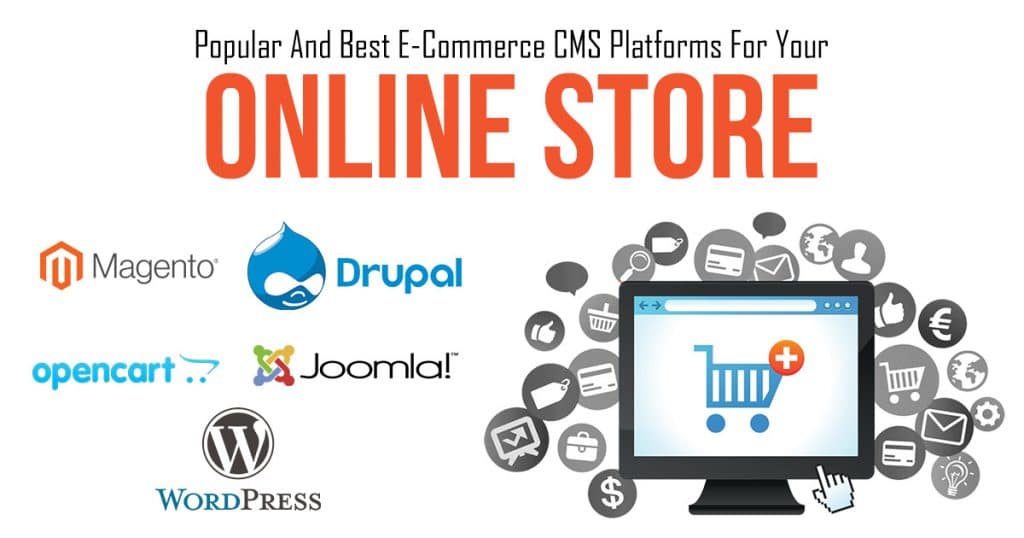There are several ways in which the Internet has touched our lives and e-commerce is definitely the major one among all. After all, why not? From online shopping, to easy ordering, to right at doorstep delivery, e-commerce is leaving no stone unturned to impress us!
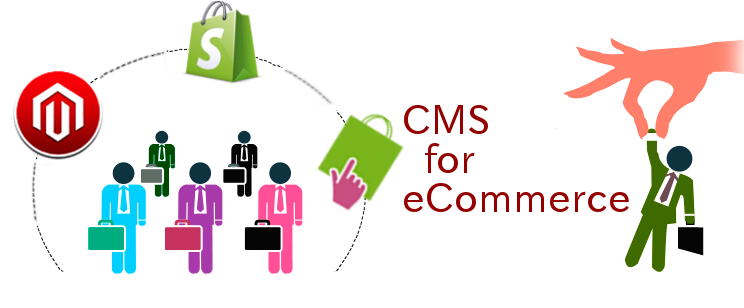
May be this is the reason that its digital buyer penetration is predicted to reach near about 50 percent of the overall Internet users in 2018. Also last year, it was recorded that more than 1 Billion opted for an online purchase and the number is estimated to grow continuously in the upcoming years (Source: armworldwide.com).
I am sure these stats are enough to make you jump into the business of setting up your own online store. Well, then what are you waiting for? Just, go ahead…
Wait…did you just asked about the process for proceeding towards this approach? Hmm…now that’s a question of concern. I understand that now you want to dig deep into this matter, but patience my friend, we will move step-by-step.
Jump to Section
Variety Of E-commerce CMS Platforms
As our first step towards this approach, let’s first learn about the types or rather options available for the development of an e-commerce website. In case, you are expecting a huge list for the same, then let me clarify there are only two!
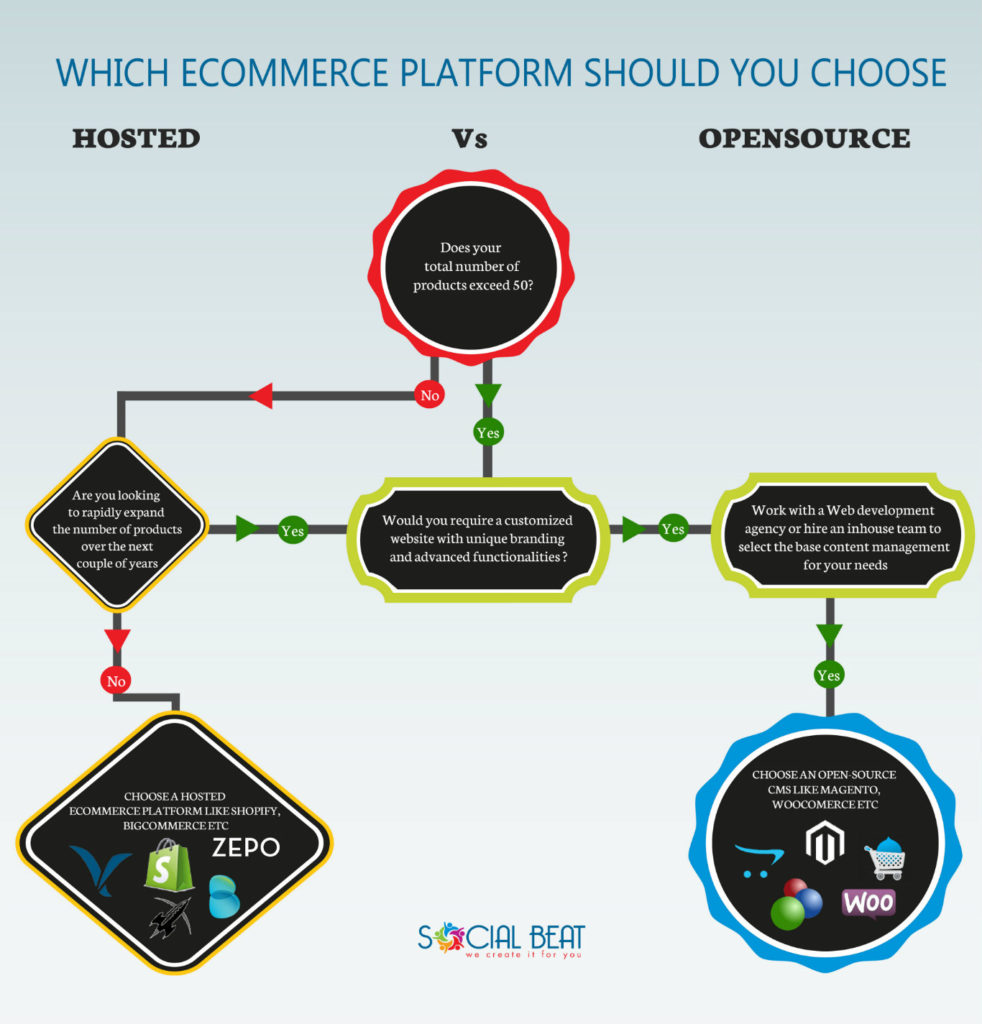
However, these two are enough to lay the strong foundation for the CMS support system. And the options are as following:
1. Hosted E-Commerce
Hosted e-commerce sites depend on SaaS (Software as an administration) framework, wherein you can join with the organization and start the store. Although you won’t have any entrance to programming for coding and change.
2. Self-Hosted E-Commerce
Self-Hosted e-commerce sites are generally termed as open-source software. This type knows no limitations and works on your command. You are simply required to download it, run it and edit it as per your required needs.
Starting with a simple to utilize and instinctive substance creation and distributing stage, and including devoted selling tools, for example, computerized and manage based number calculating and evaluating components, marketing tools, for example, email newsletter and client overviews, client encounter upgrade gadgets, for example, survey and studies, and item appraisals, e-commerce CMS arrangements are the vehicle for web offering achievement.
Picking the most simple to utilize e-commerce CMS with a sensible expectation to absorb information, an answer cap’s as reasonable as it’s versatile, and a web store administration stage that engages you towards more outcomes in insignificant time is a critical achievement factor for e-commerce. In order to abstain from losing all sense of direction in the sea of a few e-commerce CMS alternatives, and go for the best in the business, you can rely on this article!
A Review At The Best E-Commerce CMS Platforms
After analyzing the options available for e-commerce website development, you must be wondering about the actual choice to be made, as per your needs. Don’t worry, below is a quick review of the top Content Management Systems (CMS) Platforms for e-commerce:
Magento – Alter Your E-Store!

With almost 200,000 businesses already been set up on this platform, Magento remains unquestionable for its trust and credibility factor. It is regarded as the widely used open-source e-commerce software that offers downloadable content for free.
It is ideal for the use of those developers who are in need to optimize their backend workflow. It is an SEO-friendly site with a bottomless number of expansions, consistent assistance from a dynamic group. It is a versatile and cutting edge such that the dealers require not to chase for another stage in future with respect to flexibility or upgradation.
The best thing about Magento is that it involves a huge number of extensions and plugins available which further allows the addition of any new functionality in a smooth manner.
Pros:
- Powerful platform with a known level of customization and functionality.
- A vast number of marketplace extensions accessible.
- An exceptionally dynamic group for help with instructional exercises and troubleshooting alternatives.
- More SEO-friendly in comparison to other CMS Platforms.
- It is extremely adaptable – no need to move up to another stage while scaling up in future.
- Simple Integration with emailing platforms, for example, Mailchimp so you can keep in contact with your clients.
Cons:
- It requires adequate server space to work proficiently at high speeds. Small servers may cause speed and other related issues.
- May be excessively mind-boggling for organizations that are too small or start-ups.
WordPress – The Perfection Of E-Commerce Platforms!

After Magento, WordPress is one of the pioneers in the world of CMS. It packs a punch as far as valuable highlights for CMS frameworks.
Of the numerous WordPress E-commerce highlights is the way that not only it can store proprietors utilize the ready-made internet business layouts, but can likewise investigate design separation with CSS and HTML. These packs accompany video instructional exercises for simple setups, and there are mixes with prominent installment portals, for example, Stripe, Gold Cart.
The best part is that you can incorporate programmed evaluating modules and offer refined rebates and discounts to frequent customers.
Pros:
- It is an open-source platform that has the ability to modify codes without the requirement of any licensing fees.
- It is a cost-effective option for start-ups, small businesses or non-profit organizations.
- It is easy to use platform that requires little or no experience at all.
- An SEO-friendly option with a large community.
Cons:
- Does not allow to assign permissions to various people and create groups, thus leading to limitations.
- Since it is self-hosted, it may attract potential hackers.
OpenCart – A Light Weight E-Commerce Platform!

OpenCart is a free to use and upgraded e-commerce platform. It is reasonable for individuals with some website architecture and improvement encounter. It regards begin off, however won’t not be immaculate to scale.
A portion of the best highlights of OpenCart incorporates; Unlimited classes, items and producers, Multilingual, PCI Compliant, more than 20 installment passages, detailing and much more. It also allows you to choose from a variety of plugins to add more flexibility to your website.
Another extraordinary aspect concerning OpenCart’s straightforwardness is the way that it doesn’t delay your server. You can back everything off by including a huge amount of modules, obviously, however for the vast majority this ought to be one of the speedier choices.
Pros:
- Simple to use back-end.
- Highlights rich with a substantial number of modules.
- CSS can be altered from inside the administrator.
Cons:
- A few clients report trouble in the establishment of a few topics.
- Support documentation isn’t sufficiently complete.
Drupal – Seamless Integrated E-Commerce Platform!
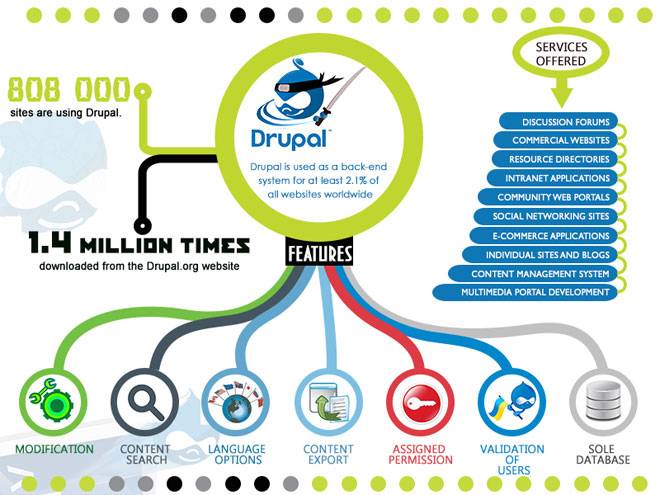
As one of my most well known open-source internet business platforms among Drupal clients, Drupal Commerce is both adaptable and SEO-friendly. It includes a simple to-utilize organization framework, and it is fit for dealing with a portion of the more perplexing inpayment models, for example, those that are membership based.
Its seamless integration with Drupal makes creating a blog or gathering considerably more advantageous than most other web-based business content administration frameworks.
Regardless of whether you are searching for a fundamental web-based business arrangement or one that you can supercharge with outsider additional items, Drupal Commerce is a practical arrangement as long as you use Drupal as your substance administration stage. Its straightforwardness and adaptability have made it the favored web-based business answer for retailers like Lush.
Pros:
- Seamless integration with the Drupal CMS structure gives it an edge over different stages with regards to blog or content reconciliation and substance showcasing.
- Takes into account simple execution of SEO methodology.
Cons:
- The support group or gathering isn’t as huge or dynamic as Magento or osCommerce.
Joomla – An Open Source CMS Platform!
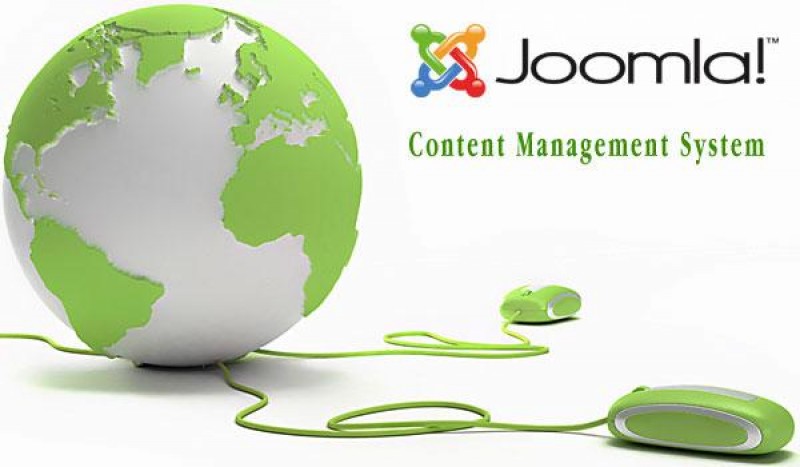
Joomla is the most prominent CMS platform used to make sites and effective online applications. It is an open source arrangement with a few viewpoints like single tick establishment, usability, extensibility and many more. It could be moved into for all intents and purposes boundless headings.
It is an open source CMS programming that involves every one of the highlights and examples to make your site the page of motivation and exemplification of specialized development. The gigantic measure of sites in light of Joomla CMS platform look profoundly expert and highlight incredible plan.
Pros:
- It is an open-source platform that has the ability to modify codes without the requirement of any licensing fees.
- Has various for e-commerce that manages your content and products in a single place.
- Editing content and structuring it on Joomla is an easy task as it feels like you are working on a Word Document only.
- The learning portion of this platform is extensively low and does not require the support of any developer for its usage.
Cons:
- It is more complex than WordPress incorporation of custom designs.
- It has a limited marketplace for additional modules and add-ons.
Choosing The Best!
At last, it’s difficult to state what the “best” stage is, as your particular needs will figure out which highlights will profit you most. In case you’re attempting to do essential online business, and you needn’t bother with an adaptable or adjustable choice, at that point one of the littler, easier web-based e-commerce platforms could be ideal for you.
Then again, in the event that you require a ton of adaptability (or you’re willing to pay for a designer), at that point, one of the all the more elite platform will probably suit your necessities.
You’re actually the appropriate one to choose what’s best for your business! Simply recall, however, that individuals will judge your whole business in light of your customer facing facade… so pick smartly!
- What Is Big Data Visualization? - January 22, 2021
- Five Benefits of Big Data Analytics for E-commerce - July 9, 2020
- Google Data Studio Vs. Tableau: Which One is More Suitable for Your Business? - June 25, 2020

